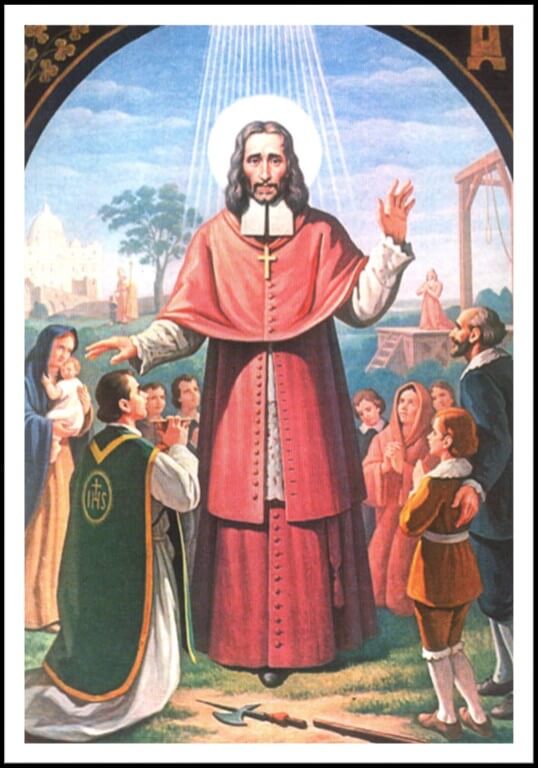
Lord, have mercy.
Lord, have mercy
Christ, have mercy
Christ, have mercy
Lord, have mercy.
Lord, have mercy
Christ, hear us
Christ, hear us
Christ, graciously hear us.
Christ, graciously hear us
God the Father of Heaven,
have mercy on us
God the Son, Redeemer of the world,
have mercy on us
God, the Holy Spirit,
have mercy on us
Holy Trinity, One God,
have mercy on us
Blood of Christ, only-begotten Son of the eternal Father,
save us
Blood of Christ, Incarnate Word or God,
save us
Blood of Christ, of the New and Eternal Testament,
save us
Blood of Christ, falling upon the earth in Agony,
save us
Blood of Christ, shed profusely in the Scourging,
save us
Blood of Christ, flowing forth in the Crowning with Thorns,
save us
Blood of Christ, poured out on the Cross,
save us
Blood of Christ, price of our salvation,
save us
Blood of Christ, without which there is no forgiveness,
save us
Blood of Christ, Eucharistic drink and refreshment of souls,
save us
Blood of Christ, stream of mercy,
save us
Blood of Christ, victor over demons,
save us
Blood of Christ, courage of Martyrs,
save us
Blood of Christ, strength of Confessors,
save us
Blood of Christ, bringing forth Virgins,
save us
Blood of Christ, help of those in peril,
save us
Blood of Christ, relief of the burdened,
save us
Blood of Christ, solace in sorrow,
save us
Blood of Christ, hope of the penitent,
save us
Blood of Christ, consolation of the dying,
save us
Blood of Christ, peace and tenderness of hearts,
save us
Blood of Christ, pledge of eternal life,
save us
Blood of Christ, freeing souls from purgatory,
save us
Blood of Christ, most worthy of all glory and honor,
save us
Lamb of God, who taketh away the sins of the world,
spare us, O Lord
Lamb of God, who taketh away the sins of the world,
graciously hear us, O Lord
Lamb of God, who taketh away the sins of the world,
have mercy on us, O Lord
V. Thou hast redeemed us, O Lord, in Thy Blood.
R. And made us, for our God, a kingdom.
Almighty and eternal God,
Thou hast appointed Thine only-begotten Son
the Redeemer of the world and willed to be appeased by his blood.
Grant, we beg of Thee,
that we may worthily adore this price of our salvation
and through its power
be safeguarded from the evils of the present life
so that we may rejoice in its fruits forever in heaven.
Through the same Christ our Lord.
Amen.
Lord, have mercy
Christ, have mercy
Christ, have mercy
Lord, have mercy.
Lord, have mercy
Christ, hear us
Christ, hear us
Christ, graciously hear us.
Christ, graciously hear us
God the Father of Heaven,
have mercy on us
God the Son, Redeemer of the world,
have mercy on us
God, the Holy Spirit,
have mercy on us
Holy Trinity, One God,
have mercy on us
Blood of Christ, only-begotten Son of the eternal Father,
save us
Blood of Christ, Incarnate Word or God,
save us
Blood of Christ, of the New and Eternal Testament,
save us
Blood of Christ, falling upon the earth in Agony,
save us
Blood of Christ, shed profusely in the Scourging,
save us
Blood of Christ, flowing forth in the Crowning with Thorns,
save us
Blood of Christ, poured out on the Cross,
save us
Blood of Christ, price of our salvation,
save us
Blood of Christ, without which there is no forgiveness,
save us
Blood of Christ, Eucharistic drink and refreshment of souls,
save us
Blood of Christ, stream of mercy,
save us
Blood of Christ, victor over demons,
save us
Blood of Christ, courage of Martyrs,
save us
Blood of Christ, strength of Confessors,
save us
Blood of Christ, bringing forth Virgins,
save us
Blood of Christ, help of those in peril,
save us
Blood of Christ, relief of the burdened,
save us
Blood of Christ, solace in sorrow,
save us
Blood of Christ, hope of the penitent,
save us
Blood of Christ, consolation of the dying,
save us
Blood of Christ, peace and tenderness of hearts,
save us
Blood of Christ, pledge of eternal life,
save us
Blood of Christ, freeing souls from purgatory,
save us
Blood of Christ, most worthy of all glory and honor,
save us
Lamb of God, who taketh away the sins of the world,
spare us, O Lord
Lamb of God, who taketh away the sins of the world,
graciously hear us, O Lord
Lamb of God, who taketh away the sins of the world,
have mercy on us, O Lord
V. Thou hast redeemed us, O Lord, in Thy Blood.
R. And made us, for our God, a kingdom.
Almighty and eternal God,
Thou hast appointed Thine only-begotten Son
the Redeemer of the world and willed to be appeased by his blood.
Grant, we beg of Thee,
that we may worthily adore this price of our salvation
and through its power
be safeguarded from the evils of the present life
so that we may rejoice in its fruits forever in heaven.
Through the same Christ our Lord.
Amen.





















